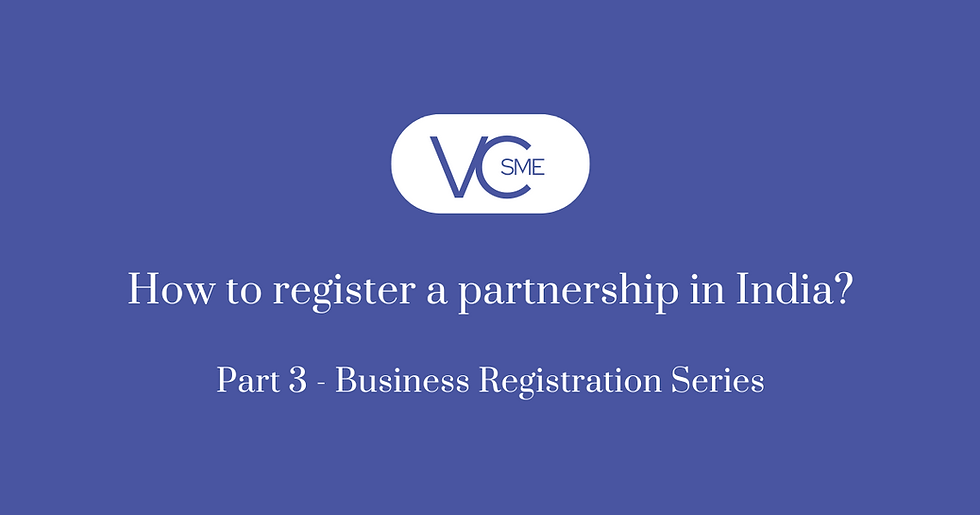What are the types of businesses in India? Part 1 of the Business Registration Series
- Krishna Bhat

- Jul 1, 2024
- 3 min read
Choosing the right business structure is a crucial first step for any entrepreneur in India. The structure you select will impact factors such as liability, taxation, and ease of operation. This article, the first part of a series on business registration in India, will provide a foundational overview of the most common types of business structures available in India.

Unincorporated Businesses
Sole Proprietorship: A sole proprietorship is the simplest form of business ownership in India. It is an unincorporated business owned and controlled by one individual. The proprietor has complete control over the business and bears unlimited liability for its debts. This means that a creditor can go after the proprietor's personal assets if the business cannot meet its obligations. Sole proprietorships are popular for small businesses due to their ease of formation and low regulatory burden. However, the unlimited liability can be a major drawback.
Partnership: A partnership is an unincorporated business owned by two or more people. Partners share in the profits and losses of the business according to a predetermined agreement. There are two main types of partnerships: general partnerships and limited partnerships. In a general partnership, all partners have unlimited liability for the debts and obligations of the business. In a limited partnership, there are two classes of partners: general partners who manage the business and have unlimited liability, and limited partners who contribute capital but do not participate in management and have limited liability to the extent of their investment. Partnerships are relatively simple to form but can be complex to manage due to the potential for disagreements between partners.
Hindu Undivided Family (HUF): An HUF is a unique type of business structure specific to India. It is a family unit recognized by law that can hold property and carry on business activities. The HUF consists of coparceners, who are all male descendants in the lineal line of a common ancestor. The coparceners share in the profits and losses of the business and have unlimited liability for its debts. HUFs are often used by families to hold property and manage businesses together. However, they can be complex to manage due to the involvement of multiple family members.
Incorporated Businesses
Limited Liability Partnership (LLP): An LLP is a relatively new form of business organization introduced in India in 2008. It combines the advantages of a partnership with the limited liability protection of a company. LLPs are formed by filing an agreement with the Registrar of Companies (ROC). The partners in an LLP have limited liability for the debts of the business to the extent of their capital contribution. LLPs are becoming increasingly popular in India due to their flexibility and ease of operation.
Cooperative Society: A cooperative society is an autonomous association of individuals who come together to meet their common economic needs. Cooperatives are formed by registering with the cooperative department of the state government. They are democratically controlled by their members, who elect a board of directors to manage the society. Cooperatives can operate in a variety of sectors, including agriculture, banking, and consumer goods.
Companies
Companies are a separate legal entity from their owners. This means that the company itself is liable for its debts, and the owners' personal assets are generally protected. There are three main types of companies in India:
One Person Company (OPC): An OPC is a special type of company designed for small businesses with a single owner. OPCs offer limited liability protection to the owner but have some restrictions on their operations, such as a cap on their annual turnover.
Private Company: A private company is a company that is not listed on a stock exchange and has a limited number of shareholders (up to 200). Private companies are the most common type of company in India.
Public Company: A public company is a company that is listed on a stock exchange and can raise capital from the public by issuing shares. Public companies have more complex governance requirements than private companies.
Choosing the right business structure is an important decision for any entrepreneur in India. The factors to consider include the number of owners, the level of liability protection desired, the amount of capital required, and the regulatory requirements. This article has provided a brief overview of the most common types of business structures in India. In the next part of this series, we will discuss the process of operation of a sole-proprietorship business in India.
Contact us today for more information, consultancy, and registration of your business.
Article written by Krishna Bhat




Comments